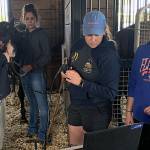Managing Refractory Glandular Gastric Disease in Horses: Steps to Treatment Success

Treating equine glandular gastric disease (EGGD)is not as straightforward as treating squamous disease (ESGD). For example, omeprazole alone successfully treats about 77% of cases in the squamous or upper region of the stomach. This same acid-blocking drug is only effective in about 20% of horses with ulcers in the glandular or lower region of the stomach. With sucralfate, healing rates for glandular disease can climb to over 60%, but many cases of EGGD are still considered refractory or resistant to treatment.
Rather than continuing the “scope-treat-scope-treat” cycle in horses with refractory glandular disease, a stepwise holistic approach is more effective, according to Ben Sykes, B.Sc., B.V.M.S., M.S.
Sykes presented his holistic approach to attendees during the 69th Annual Convention of the American Association of Equine Practitioners. In his opinion, taking the focus off the endoscopic appearance of the stomach and instead using his logical, stepwise approach will better alleviate disease in cases that are resistant to traditional treatments.
Some of those steps include:
- Looking to confirm the relevance of the disease in the primary presentation. In other words, is EGGD clinically significant, or should other differentials be considered? This can include musculoskeletal disease, dental disease, inflammatory bowel disease, or even sand enteropathy. “Concurrent disease can contribute to EGGD via pain-induced behavioral stress or can mimic clinical signs commonly attributed to glandular disease,” advised Kathleen Crandell, Ph.D., a Kentucky Equine Research
- Addressing any identified risk factors and optimizing management. “Horses at risk for EGGD should have two to three rest days per week and their behavioral stress can be minimized via music therapy, massage, and additional behavioral enrichment techniques,” Crandell relayed.
- Switching therapy. Sykes recommends changing drug therapies if there is no response in eight weeks. For example, if omeprazole and sucralfate do not work, try switching to misoprostol. Reassess after four weeks.
- Ensuring optimal omeprazole administration. Be certain to give omeprazole (4 mg/kg by mouth once daily) after an overnight enforced fast. If not, a positive clinical response can still occur, but acid suppression may not be optimized to allow the healing of the gastric lesions.
Sykes said, “When possible, the horse should be exercised in the morning shortly after omeprazole administration when its acid-suppressive effects are maximized.”
He acknowledged that the management of refractory EGGD is frustrating, but using these steps has resulted in acceptable to good outcomes.
“Owner compliance is high, and most owners appreciate the shift in approach to being centered on the horse’s welfare and focused on their primary presenting complaint, rather than the more technical approach of being lesion-focused,” Sykes said.
“EGGD is a complex disease and simply scoping a horse to visualize the lesions via endoscopy does not tell the whole story,” Crandell added.
“Because EGGD is an inflammatory disease, another evidence-backed supplement that may help protect the gastric mucosa is ReSolvin EQ, which contains omega-3 long-chain polyunsaturated fatty acids that reduce inflammation. In a recent trial, supplementation with ReSolvin EQ was positively associated with preventing or resolving severe squamous gastric ulceration,” Crandell explained.
In a review paper titled “Equine Gastric Ulcer Syndrome: An Update on Current Knowledge,” the authors remarked, “…to prioritize the supplementation of omega-3 long-chain polyunsaturated fatty acids, such as in highly palatable fish-oil based supplementation, when possible, the omega-3 short-chain polyunsaturated fatty acids secondarily, such as in flax-based products, with omega-6 and omega-9 polyunsaturated based oil reached for lastly.”**
In Australasia and the Middle East, look for Sucralox, a sucralfate supplement.
Feeding alfalfa may also benefit horses with gastric ulcers due to its natural antacid properties. In a recent French study, feeding pelleted dehydrated alfalfa reduced the incidence and severity of EGGD.***
*Sykes, B. How to manage refractory equine glandular gastric disease. 2023. In: Proc. American Association of Equine Practitioners 69:327-330.
**Vokes, J., A. Lovett, and B. Sykes. 2023. Equine gastric ulcer syndrome: An update on current knowledge. Animals 13:1261.
***Julliand, S., M. Buttet, T. Hermange, P. Hillon, and V. Julliand. 2023. Effect of diet composition on glandular disease in horses. Journal of Veterinary Internal Medicine:16747.








